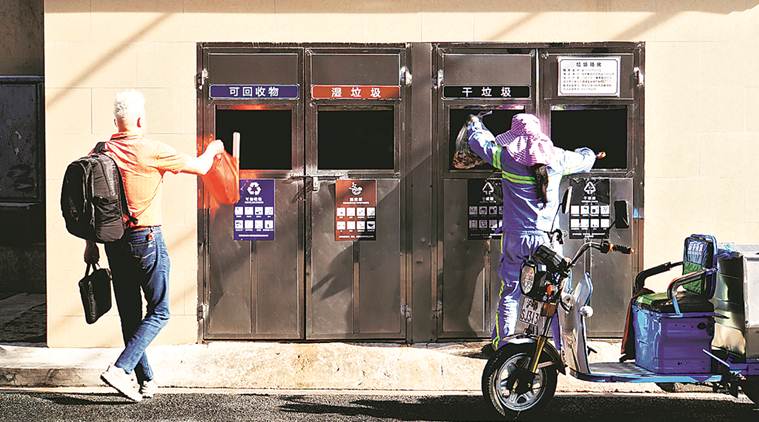
A five-star hotel in Shanghai was the first to receive a warning for violating the city’s new domestic garbage sorting regulations that came into effect Monday. The new policy makes it compulsory for people and businesses in Shanghai to sort their garbage into four types: dry waste, wet waste, hazardous and recyclable. The efforts are part of China’s national push to reduce waste and increase recycling, according to the Ministry of Housing and Urban-Rural Development, through which China hopes 46 cities will recycle more than 35 per cent of overall waste by 2020.
Individuals may be fined anything from 50 to 200 yuan (one yuan converts to roughly Rs 10) for not complying with the new waste management policy, while enterprises can be fined up to 5,000 yuan for failing to have the right trash bins in place. The fine could go up to 50,000 yuan if enterprises refuse to rectify their mistakes. The new rules have led to a host of jokes on Chinese social media as residents try to make sense of it.
To break down the classification, household waste, which is referred to as wet waste, includes perishables like leftovers, rotten food, flowers and plants, and goes into a brown rubbish bin. Dry waste goes into the black rubbish bin, which includes items like used tissues, bubble tea cups and oyster shells. While the blue recyclable waste bin is where paper, plastic and textiles go, the red hazardous bins are where anything harmful like expired medicines, batteries and light bulbs get disposed off. “Finally, for all the pet owners out there: animal waste should be flushed down the toilet. If you’re still not sure, add the city’s official WeChat account ‘shanghaifabu’ to search through the trash-sorting database,” said an explainer on the Time Out Shanghai website.
According to Chinese state-news agency Xinhua, the regulations were approved in January by city legislators who classified the garbage into four categories. “If residents are not clear whether a kind of garbage is wet, dry or recyclable, they can treat it as dry garbage, the legislation commission of Shanghai People’s Congress said June 30,” the Xinhua report said.
“The commission explained that wet garbage requires as precise sorting as possible to enable it to be made into useful biological substances or disposed off without harming the environment, and residents are encouraged to sort out recyclable garbage as all dry garbage will be mainly burnt up in disposal,” the report said.
Further, hotels in Shanghai are also instructed to stop offering disposable toiletry kits such as toothbrushes, combs, bath sponges, razors, unless it is requested by customers. On Monday, the Xinmin Evening News reported that a rectification notice was issued to a five-star hotel for “failing to put municipal solid waste into the corresponding trash can”.
Though reports point out that a total of 13,000 garbage-dumping spots at residential complexes have been upgraded, residents in some areas are unhappy with the short time-frames designated for garbage disposal. The disposal sites are only open and available during set timings in the morning and night, making it difficult for working people.